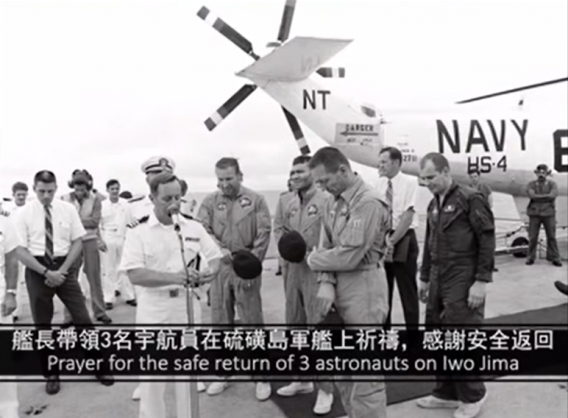Malaysia Baptist Theological Seminary (MBTS) live-streamed a Mid-Autumn Festival special lecture, telling the moving stories of Christian scientists.
Rev. Dr. James Hwang, a space scientist who had served in NASA for 15 years and now works in a ministry, reviewed the history of the moon landings to help a Mandarin-speaking audience to know the God who created the moon and stars in the lecture themed “When Apollo Met Chang’e1” as part of the MBTS series “Faith, Science and Culture”.
Mid-Autumn Festival is held on the 15th day of the 8th lunar month each year, a full moon night, and it fell on the 21st of September in the Gregorian Calendar this year. Moon-viewing has not only been a long-standing tradition of the Mid-Autumn Festival but also a common theme in poems and folk literature in Chinese culture.
Earning a doctor's degree in engineering from Lamar University in the USA with 25 years of experience in engineering, Dr. Hwang started by quoting the well-known verses of Chinese poet Su Shi’s Mid-Autumn poem: “People experience sorrow, joy, separation and reunion. The moon may be dim or bright, round or crescent-shaped”. Hwang then explained the movements of the moon and the earth and continued by sharing Bible verses Genesis 1:14-15, Psalm 104:19, and Psalm 8:3-4 to highlight God’s creation and mindful design of the heavens and the earth.
As the main feature of the talk, he shared the history of moon landings. In 1961, President Kennedy announced the Apollo Program was to land humans on the moon within 10 years. The first attempt Apollo 1 failed in 1967 in a rehearsal launch and three astronauts died, one of whom had previously expressed the wish to land a Bible on the moon.
“Out of the ashes of the tragedy came the Apollo Prayer League with a mission to land a Bible on the moon,” he added.
From then on, many scientists had made efforts to achieve the Apollo Program. Among them, Wernher von Braun, known as the father of the space rocket, and Chinese American scientist Dr. Frederick Dawn, had both given moving Christian testimonies.
Wernher von Braun once said, “My experiences with science led me to God. They challenge science to prove the existence of God. But must we really light a candle to see the sun? Through science, man strives to learn more of the mysteries of creation. Through religion, he seeks to know the Creator.”
As the developer of a non-flammable EVA suit and as the only Chinese in NASA at that time, Dr. Frederick Dawn was under great pressure after the failure of Apollo 1. He worked day and night and had a stroke in the end.
He testified, “God healed me. God is a living God! All that I was able to accomplish is by God’s grace. May glory and honor be to him.”
On the Christmas Eve of 1968, Apollo 8 became the first crewed spacecraft to make the first circumlunar flight. The three-astronaut crew did a television broadcast when orbiting the moon on Christmas Eve, where they read the first ten verses from the Book of Genesis.
Apollo 11 was the first spaceflight that landed humans on the moon. Buzz Aldrin, one of the three astronauts, took the communion after landing on the moon as a gesture of thanksgiving. Before taking the bread and the cup, he read two passages from the Bible, John 15: 5 and Psalm 8: 3-4. These verses became the first verses read on the moon.
At the time of Apollo 13, 512 Bible copies on microfilm were packed on board, with the intention of leaving these on the lunar surface. However, two days into the mission an explosion in an oxygen tank severely damaged the spacecraft. In face of this crisis, President Nixon called for prayer vigils around the world. Thousands of people prayed in Times Square, at Chicago’s Board of Trade, at the Wailing Wall of Jerusalem and in St. Peter’s Square. In the end, the three astronauts made a narrow escape and returned to the earth safely, and they gave thanks upon landing at Iwo Jima.
On February 5, 1971, as Apollo 14’s lunar module touched the surface of the moon carrying the first lunar Bible, the quest and mission of the Apollo Prayer League was finally realized. Many of the Apollo program astronauts experienced God in space in one way or another, and several became Christians and later served God in the ministry.
China's Chang'e 4 spacecraft carrying the Yutu-2 rover was launched on December 8, 2018, and successfully completed the world's first soft landing on the far side of the moon on January 3, 2019. The US Lunar Reconnaissance Orbiter, which has been in lunar orbit for 10 years, captured precious footage of the Yutu-2 rover on the moon- “Apollo met Chang’e”.
Dr. Hwang who served at NASA as an engineering manager for 15 years and also holds a doctoral degree in ministry and apologetics from Dallas Theological Seminary ended by quoting Michael Collins’ prayer, an astronaut of Apollo 11: “Creator of the universe: Your dominion extends throughout the immensity of the space... Save us from our arrogance as we forget that our achievements are grounded in you. Protect our travels beyond the reach of the earth that we may glory evermore the wonder of your creations. Through Jesus Christ, Your Word, by whom all living things came to be, who with you and Holy Spirit lives and reigns, One God, forever and ever, Amen!"
Dr. Hwang is an assistant professor of missions and practical theology at Logos Evangelical Seminary, senior adviser at Far East Broadcasting Company (a Christian mission organization), and has been a conference speaker and Bible teacher for over 20 years.
1. Chang’e in Chinese mythology is an “immortal”. After taking an elixir of immortality, she flew up to the moon and continued to live there.
- Translated by Grace Song












